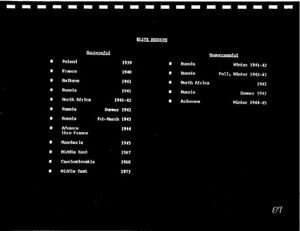Patterns of Conflict
| The works of |
| Works of John Boyd |
|---|
OODA WIKI Edition
Quantico Transcription
So here’s some examples, then, of the successful: Poland. When we’re talking about advance through France, I’m talking about Patton. Manchuria, the Russians against the Japanese Kwantung [PH] Army. The Middle East, the Israelis, Czechoslovakia, the Russians. The Middle East again, the Israelis after they got their act together. They had a little bit of problem at the beginning.
And then Russia, unsuccessful, winter campaign, fall/winter, North Africa, summer, et cetera. Let me talk to the Fall/Winter campaign 1942, ’43. What was beginning to happen here? The initial campaign, why was it unsuccessful in a lot of the cases? In fact, I’ll go down to the Ardennes.
As time went on, Hitler began to put himself more and more into the operational aspect of the war. In other words, you can see him start interfering in operations. And so the command structure became more and more rigid and less flexible. So by the time he got down to the Ardennes here, boy, he was determined how the operation was going to be conducted, not the commanders.
And every German officer I’ve talked to, I said why did he do that? And they said, very simple reason. He did not trust his commanders, he mistrusted his commanders. Did not trust his commanders. So that’s an essential truth.
What I’m saying, all centralized command and control systems are based upon mistrust, not trust. Otherwise, why do you need it? It’s based upon mistrust, not trust. [15:00] Now I didn’t say you shouldn’t have it.
Can you think of circumstances where even in spite of that, you definitely want a centralized command and control? And that’s when you’re dealing with strategic nuclear warfare. Because you don’t want some guy flinging off a goddamn weapon. So that is based upon mistrust, and it should be. That’s one reason.
In talking to Balck and others, particularly Balck, made it out true. He said there’s some other reasons why you want to do that, you might want to have real close guidance. He said, remember, let’s pretend you’re a division commander.
Let’s just imagine you’re division commander. He said, you don’t get the pick of the litter.
You’re going to get some choice of people you want. You’re also going to have to take some choices you don’t want. And the reason why you’re going to take them is other people don’t want them either. So you’re going to have to be a little bit more careful.
So the point is, what you want to do is have one kind of orders for one guy, a different kind of orders for the other guy. In other words, you give some people a long leash, more detailed orders for somebody else.
So instead of having one command and control system, in a sense you have multiple command and control systems so you can maintain that organic wholeness. Now, with our modern electronic communications, how in the hell can you do that? If you depend upon just electronics, you can’t.
And that’s why they had verbal orders only. Don’t you understand? Because you can do it that way. But if you send out a message, then it has to be the same kind of message for everybody.
But now when you do it verbal orders only, you can be sure that you’re going to tailor your order to the kind of guy you’re dealing with. In other words, it’s personality-related. You’re communicating on multiple channels.
And what is that command? You’re not even going to be able to do that unless you know your own people. So if you’re sitting back in a chateau somewhere and don’t know your own people, you don’t know what orders— what different orders you can give to different people to realize your intent.
Some guys, you’re going to put on a long leash. In fact, he talked about a couple of those guys. One guy, Christ, he only talked to him maybe once a week. He knew what had to be done. He says, if you have trouble, call me back once in a while and we’ll go over it again. Those other guys, he watched them every goddamn day.
But remember, the only way you can do that is if you know your people. And if you don’t know them, you can’t play that game. Very important. Okay?
